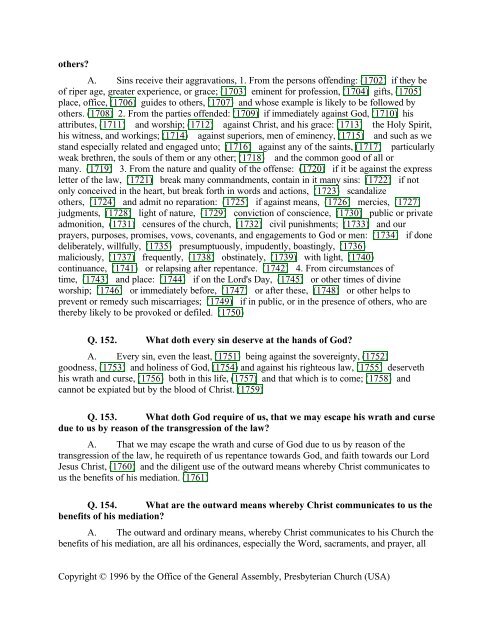The Book of Confessions - The Presbyterian Leader
The Book of Confessions - The Presbyterian Leader
The Book of Confessions - The Presbyterian Leader
Create successful ePaper yourself
Turn your PDF publications into a flip-book with our unique Google optimized e-Paper software.
others?<br />
A. Sins receive their aggravations, 1. From the persons <strong>of</strong>fending: (1702) if they be<br />
<strong>of</strong> riper age, greater experience, or grace; (1703) eminent for pr<strong>of</strong>ession, (1704) gifts, (1705)<br />
place, <strong>of</strong>fice, (1706) guides to others, (1707) and whose example is likely to be followed by<br />
others. (1708) 2. From the parties <strong>of</strong>fended: (1709) if immediately against God, (1710) his<br />
attributes, (1711) and worship; (1712) against Christ, and his grace: (1713) the Holy Spirit,<br />
his witness, and workings; (1714) against superiors, men <strong>of</strong> eminency, (1715) and such as we<br />
stand especially related and engaged unto; (1716) against any <strong>of</strong> the saints, (1717) particularly<br />
weak brethren, the souls <strong>of</strong> them or any other; (1718) and the common good <strong>of</strong> all or<br />
many. (1719) 3. From the nature and quality <strong>of</strong> the <strong>of</strong>fense: (1720) if it be against the express<br />
letter <strong>of</strong> the law, (1721) break many commandments, contain in it many sins: (1722) if not<br />
only conceived in the heart, but break forth in words and actions, (1723) scandalize<br />
others, (1724) and admit no reparation: (1725) if against means, (1726) mercies, (1727)<br />
judgments, (1728) light <strong>of</strong> nature, (1729) conviction <strong>of</strong> conscience, (1730) public or private<br />
admonition, (1731) censures <strong>of</strong> the church, (1732) civil punishments; (1733) and our<br />
prayers, purposes, promises, vows, covenants, and engagements to God or men: (1734) if done<br />
deliberately, willfully, (1735) presumptuously, impudently, boastingly, (1736)<br />
maliciously, (1737) frequently, (1738) obstinately, (1739) with light, (1740)<br />
continuance, (1741) or relapsing after repentance. (1742) 4. From circumstances <strong>of</strong><br />
time, (1743) and place: (1744) if on the Lord's Day, (1745) or other times <strong>of</strong> divine<br />
worship; (1746) or immediately before, (1747) or after these, (1748) or other helps to<br />
prevent or remedy such miscarriages; (1749) if in public, or in the presence <strong>of</strong> others, who are<br />
thereby likely to be provoked or defiled. (1750)<br />
Q. 152. What doth every sin deserve at the hands <strong>of</strong> God?<br />
A. Every sin, even the least, (1751) being against the sovereignty, (1752)<br />
goodness, (1753) and holiness <strong>of</strong> God, (1754) and against his righteous law, (1755) deserveth<br />
his wrath and curse, (1756) both in this life, (1757) and that which is to come; (1758) and<br />
cannot be expiated but by the blood <strong>of</strong> Christ. (1759)<br />
Q. 153. What doth God require <strong>of</strong> us, that we may escape his wrath and curse<br />
due to us by reason <strong>of</strong> the transgression <strong>of</strong> the law?<br />
A. That we may escape the wrath and curse <strong>of</strong> God due to us by reason <strong>of</strong> the<br />
transgression <strong>of</strong> the law, he requireth <strong>of</strong> us repentance towards God, and faith towards our Lord<br />
Jesus Christ, (1760) and the diligent use <strong>of</strong> the outward means whereby Christ communicates to<br />
us the benefits <strong>of</strong> his mediation. (1761)<br />
Q. 154. What are the outward means whereby Christ communicates to us the<br />
benefits <strong>of</strong> his mediation?<br />
A. <strong>The</strong> outward and ordinary means, whereby Christ communicates to his Church the<br />
benefits <strong>of</strong> his mediation, are all his ordinances, especially the Word, sacraments, and prayer, all<br />
Copyright © 1996 by the Office <strong>of</strong> the General Assembly, <strong>Presbyterian</strong> Church (USA)




